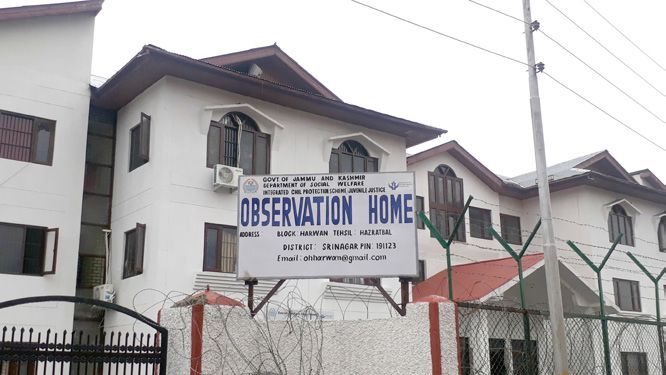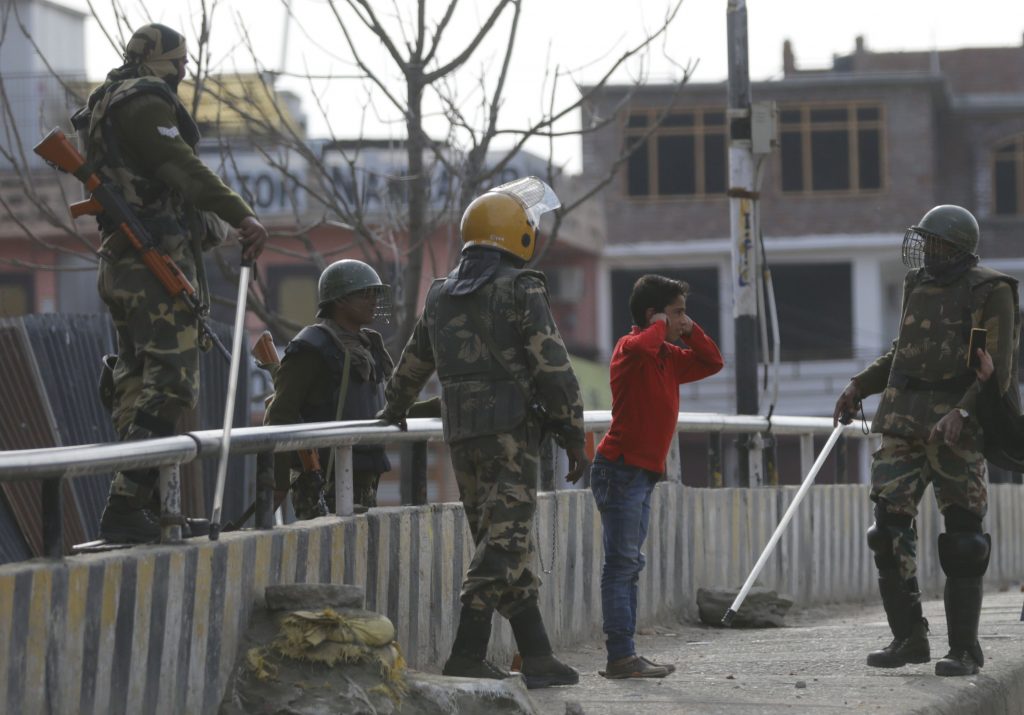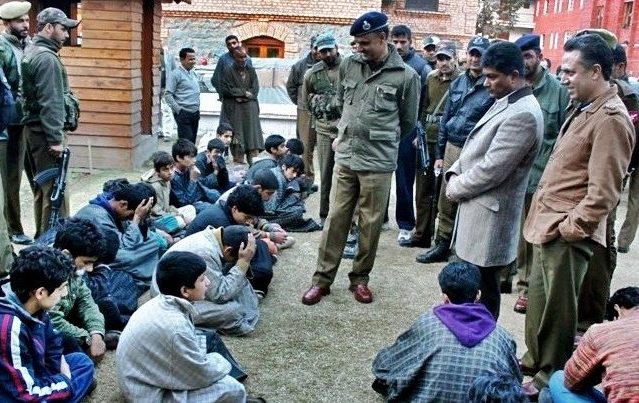What are many Indian teengaer’s biggest concerns when they are 15 years old? Homework? Upcoming exams? Family pressures? No We do not need an expert to tell us that teenagers are subject to extreme social pressures. Now, imagine all these issues and place it in the context of a conflict that has been raging in your region for as long as you can remember; for as long as your parents can remember.
No one has an easy life in Kashmir, but can we even begin to imagine the kind of pressure, anger, disbelief, frustration and general helplessness that a school student in Kashmir undergoes? A student in a town like Shopian, for example, might consider himself lucky just to be alive: they have seen their friends being shot, injured, and arrested. As a Kashmiri teenager, what do you do? Not protest against the occupation? That might still get you caught in a crossfire. Keep quiet and focus on your studies? How do you do that when there is an encounter happening right next to your house? Or when tear gas shells land inside your house?
In December, two teenagers–Saqib Majeed and Mudassir Paray–became another statistic in Kashmir. They were killed in an encounter with security forces and Indian media barely noticed the fact that the two ‘militants’ were 17 and 14 years old It made no difference. What forces a 15-year-old to pick up a gun? What forces a 12-year-old to pick a stone to hurl at security forces? What makes a 17-year-old believe that death at the hands of Indian forces is a better option that living a ‘normal’ life?
In this 6-part series, TwoCircles.net’s Kashmir correspondent Auqib Javeed looks at all the aspects of being a teenager in Kashmir: a militant, a protester, a mere bystander and a victim. If you pick a gun, you will be labelled a militant and shot; if you pick a stone, you will be labelled ‘anti-India’ and arrested and put in juvenile homes. If you are lucky, you will only be beaten up a little; if you are not, you will end up with bruises that will never leave you. And if you do neither, you still stand a very high chance of ending up being arrested or killed.
In the fourth of the six-part series, we look at what happens to teenagers who do not get killed by security forces and instead, are merely arrested.
If Mudassir and Saqib had been caught instead of being encountered what would have been their fate? In all probability, they would have ended in a juvenile correctional facility. And while the condition of such facilities leaves much to be desired across the nation, the condition in Kashmir is especially worse. The teenagers are regularly beaten up while the state government regularly files cases against them ruining their chance to live a decent life.
By TCN Correspondent
Srinagar:- *Rayees Ahmad was just 13 when he was arrested and lodged in a police station in the downtown area of Srinagar. For the next 15 days, he was abused and beaten with a cricket bat especially made for the “stone pelters” by the Jammu and Kashmir Police cops in the police station. Like hundreds of minors detained on charges of stone pelting, Rayees’ story is no different. He was arrested on charges of waving a Pakistani flag in Srinagar’s Jamia Masjid in 2015.
Spending 15 days in the police lock-up was a nightmare Rayees had never signed up to. He was also taken to Srinagar’s dreaded interrogation centre know as Cargo, where he was “kicked continuously in the Abdomen” and his buttocks turned red due being beaten up by the cops during interrogation.
“When I was shifted to Juvenile home after 15 days, I couldn’t sleep on my back such was the conditions of my buttocks. I was in deep trauma. All I wanted to see my parents again. Today after many years, when I recall my days in police station I question my existence,” says Rayees.
His friend *Ehtisham was also booked with him under similar charges. This correspondent met both when they came together for hearing their cases in Juvenile Justice Board (JJB) in Bemina area of Srinagar city.
Ehtisham and Rayees were arrested the same day and were kept in the same lock-up. While recalling those days, Ehtisham says the Police refused to provide them bedding to sleep and he used an empty soft drinking bottle as his pillow.
“I remember when a policeman came in the middle of the night and started screaming and abusing us. I was in deep sleep and due to his sudden screaming, my heart started beating fast. I thought he had come to kill us,” Ehtisham says.
Both Rayees and Ehtisham say whenever they see a policeman their “blood boils”. They say they were innocents and were deliberately booked in a fabricated case.
“Being a resident of Downtown (Srinagar locality) is enough for a policemen to book you. They do it because they can’t arrest the real trouble makers and when the pressure piles-up from their bosses, they catch anyone and keep them in lockup,” says Ehtisham.
Both the minors say police lack evidence to prove them guilty that is why the case is being dragged and dragged on.
“I don’t say we never pelted stones…like everyone we also used to participate in stone pelting but later we refrained from doing so. And even if we accept their claim that we waved a Pakistani flag for a minute, is this the way to treat your children?” they questioned.
Like Ehtisham and Rayees, hundreds of minors along with their parents have come for hearing the cases. The three-storey building in the locality is so overcrowded; one barely gets a glimpse of judge.
Most of the accused are from poor families and struggle to arrange the fee and other expenses for their lawyers. In most of the cases, the Jammu and Kashmir Bar association has come forward to help them free of cost but the prolonged cases and un-ending hearings in the board are leaving the accused helpless and they find it difficult to see any ray of hope and justice.
Danish Nabi*, now an adult. says it has been five years since he was arrested on charges of stone pelting and booked under draconic Public Safety Act (PSA). After being kept in the local police station for a month, he was shifted to Kot Bhalwal jail in Jammu.
“I was crying in the jail, I was missing my family and home badly. The prisoners in the jail were my father’s age…although they treated me well but the time I spend there was the worst of my life and now the hearings in this court has made it hell,” he says while showing his documents that he carries with him during the hearings.

According to a report, Juveniles continue to be jailed in Kashmir despite there being a juvenile law in place.
Advocate Shafqat Hussain, a senior lawyer at High Court who has represented thousands of PSA detainees in Court since the early 90s, believes that the state is at war with people where the law doesn’t exist at all.
“These juvenile homes, observation centers and other laws made for minors are just only on paper…they are not implemented in true spirit,” he said while speaking to TwoCircles.net.
Shafqat says when a minor is arrested he is put in jail illegally because “they have to produce the minors in the Juvenile justice board within 24 hours of detentions. But they keep them in lockup for many days with the criminals and drug addicts. The other important thing is that they often abuse the parents of these minors in from of the children,” he says adding that it affects the psyche of a minor and as a result he chooses violent means to vent out his anger.
Children have been one of the worst-affected groups in the conflict in Jammu & Kashmir. They have been both direct and indirect victims of the conflict and have suffered psychologically, socially, economically and educationally. Children have been killed, injured, faced inhuman and degrading treatment, been victims of torture and sexual violence and become victims of pellet shotguns, revealed a JKCCS report called Terrorized: Impact of Violence on the Children of Jammu and Kashmir, which was released in March last year.

According to the data maintained by APDP and JKCCS, at least 31 children have been killed in different incidents of violence in 2018–besides several cases of injuries. In 2018, children account for about 20% of the killings of 159 civilians in Kashmir, which is the highest in last ten years.
The March 2018 JKCCS report on the impact of violence on the children of Jammu and Kashmir found that from 2003 to 2017, a total of 318 children have been killed in Jammu and Kashmir. Out of these 144 children were killed in actions by Indian armed forces and Jammu & Kashmir Police while 147 children were killed by unidentified gunmen. While 15 children died in shelling and firing across the Line of Control, 12 were killed by militants.
According to a report, booking minors under the PSA and lodging them in jails is in contravention with the Jammu & Kashmir Juvenile Justice (Care and Protection of Children) Act, 2013230 which states that all juveniles in conflict with law shall be placed under the custody of a special juvenile police unit or in an observation home. Additionally in 2012, the Jammu and Kashmir State Assembly amended PSA to prohibit the detention of children below 18 years of age, yet detentions continue.
The JK Juvenile Justice Act 1997 was amended in 2013 and the amended rules laid out the formation of Juvenile Justice Boards in each district of Jammu and Kashmir headed by a magistrate. The purpose of these juvenile justice boards is to protect the rights of children in conflict with the law, but the state government has not only failed at setting up juvenile boards, but through its callous attitude towards protection of child rights, the state government has actually shown how little it cares little about children in contravention with the law.
The state government has also failed to sanction child protection officers and establishing special homes for juveniles in conflict with the law in each district. Kashmir valley has only one Juvenile Home in Harwan area of Srinagar. Most of the child detainees, only after the High Court has established them as minors, are taken to the Harwan Juvenile home in outskirts of Srinagar.
A top police official admits that lack of manpower is the reason that the minors are not treated according to the the Juvenile Justice Act.
“When we arrest a minor, we keep him in a separate room but after one day we shift them to Harwan Juvenile home in Srinagar because most of the districts lack basic facilities,” he says while wishing anonymity.
For Rayees, Ehtisham and Danish, their childhood is getting ruined due to aggressive policies of the state towards the youth.
Rayees wanted to leave the place and wish to earn for his family in Dubai but he couldn’t get a passport.
“See how many kids are here for hearing, I can assure you there are more than 10,000 minors who are at the brink of picking up the gun because they are being humiliated by the state,” Rayees adds.
Ehtisham gives the example of Mudasir Parry and Saqib Bilal, the two teenagers who were killed in a encounter last year.
“We don’t have an option other than picking up guns because the state is forcing us to do so and they are happy with it,” says Ehtisham.
Note: *Names have been changed to protect identity


